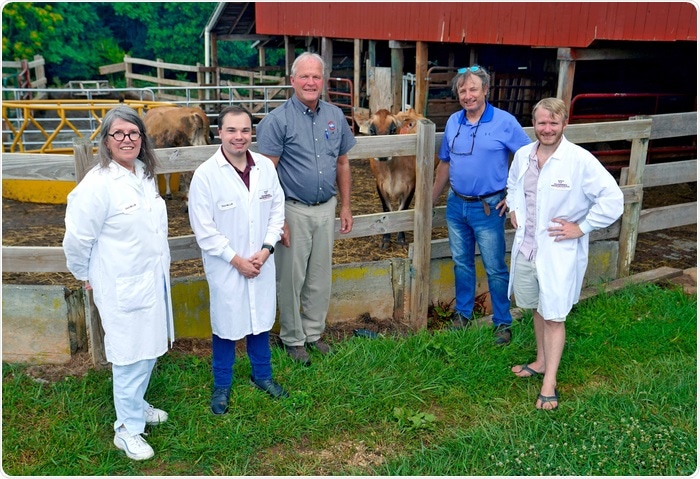Cells produce exosomes, the nano-sized biological capsules, to protect and courier delicate molecules across the body. The capsules are hard enough to resist enzymatic breakdown and acidic and temperature fluctuations in the bloodstream and gut, which makes them a major candidate for drug delivery.

Virginia Tech scientists at the Fralin Biomedical Research Institute at VTC have developed a novel way to isolate exosomes from cow’s milk. Donnie Montgomery (center) of local dairy producer Homestead Creamery provided the scientists with unpasteurized milk samples for experimentation. The research team (from left) Jane Jourdan, Kevin Pridham, Rob Gourdie, and Spencer Marsh published their purification protocol was this month in Nanotheranostics. Image Credit: Whitney Slightham/Virginia Tech
Harvesting them to attain clinical-grade levels of purity is a complex procedure.
Exosomes are abundant in cow’s milk, yet they’re difficult to isolate from other milk proteins and lipids.”
Rob Gourdie, Professor and Director, Center for Vascular and Heart Research, Fralin Biomedical Research Institute, Virginia Tech Carillion
Gourdie’s lab devised a scalable process to harvest exosomes from unpasteurized cow’s milk. Through this purification process, the scientists can extract around a cup of purified exosomes for every gallon of unpasteurized milk. The study was published this month in the Nanotheranostics journal.
“For the first time, we’ve charted a path toward the industrial scalability of exosome purification for oral drug delivery,” added Gourdie, who is also the Commonwealth Research Commercialization Fund Eminent Scholar in Heart Reparative Medicine Research and a professor of biomedical engineering and mechanics in Virginia Tech’s College of Engineering.
The scientists devised their multi-step, inexpensive purification process that improves filtration methods, and the timing of temperature and chemical treatments affecting calcium levels, during the COVID-19 pandemic. Spencer Marsh and Kevin Pridham, postdoctoral fellows in Gourdie’s lab at the Fralin Biomedical Research Institute, and Jane Jourdan, Gourdie’s lab manager, carried out the practical work to create the proprietary procedure.
Our team worked together effectively and safely on this project throughout the pandemic. It was a sight to see—their selfless teamwork, enthusiasm, and dedication to overcoming challenges is something that does not happen as often as you might think in science. There were many failures, but eventually, we figured out stepwise processes that worked.”
Rob Gourdie, Professor and Director, Center for Vascular and Heart Research, Fralin Biomedical Research Institute, Virginia Tech Carillion
Joy Wolfram, assistant professor of medicine at Mayo Clinic who was not part of the research, states the novel protocol increases the pharmaceutical potential for exosomes.
What’s remarkable is the quantity of extracellular vesicles they are able to produce. Isolating and manufacturing extracellular vesicles in a scalable manner has always prevented their translation into the clinic, but this paper shows a path to overcome those roadblocks.”
Joy Wolfram, Assistant Professor, Medicine, Mayo Clinic
Wolfram earlier published a protocol for employing tangential flow filtration technology that Gourdie’s team adjusted to isolate the milk exosomes.
Exosomes are secreted naturally by a majority of the cell types in humans and other mammals and are also found copiously in lymph, blood, milk, and urine. They are lined with protective membranes and send snippets of genetic material, biomolecules, and chemical signals in between cells over long ranges.
For the past 10 years, extensive research has been carried out into their pharmaceutical applications—specifically for the delivery of fragile drugs, like peptides and microRNAs.
“Imagine instead of getting a vaccine shot, your nurse hands you a milkshake instead. Another milkshake may contain exosomes loaded with a therapeutic peptide designed to protect internal organs such as the heart from myocardial infarction,” added Gourdie.
Exosomes can penetrate the blood-brain barrier, a membrane that safeguards the brain from unwanted chemicals and pathogens, presenting a novel means to deliver therapeutics to treat brain cancer and neurological diseases.
“Improving the viability of using exosomes opens up a wide range of drug delivery methods with unlimited clinical applications,” remarks Gourdie.
Gourdie collaborated with Homestead Creamery, a local dairy processing plant, to procure unpasteurized milk samples for the research.
“We have always built our business on relationships, and this is an exciting collaboration for us,” states Donnie Montgomery, co-founder and co-owner of Homestead Creamery.
Last year, Gourdie licensed the intellectual property to deliver heart medicine employing exosomes through Virginia Tech’s license: Center for Technology Commercialization and created The Tiny Cargo Co.
Source:
Journal reference:
Marsh, S. R., et al. (2021) Novel Protocols for Scalable Production of High Quality Purified Small Extracellular Vesicles from Bovine Milk. Nanotheranostics. doi.org/10.7150/ntno.62213.